Innovation Strategy & Roadmap: Memory Café Program at Community Library

Overview
Memory Cafes are social spaces designed for individuals with memory loss and their caregivers to engage in supportive, enriching activities. These gatherings offer an opportunity for people to connect, share experiences, and partake in fun and cognitive-stimulating activities. For the Community Library, implementing a Memory Café program aligns with our mission to promote inclusivity, foster social connections, and enhance the well-being of our community.
This roadmap outlines the strategy for launching a Memory Café program at Community Library, utilizing a participatory, non-technical service that will positively impact individuals with memory loss and their caregivers. The initiative will also help combat social isolation, which is common among those affected by memory loss, while promoting the library as an accessible, supportive environment for all patrons.
“This exemplifies the potential of thinking beyond collections to a library space that promotes creativity and collaborative learning. (Stephens, 2016).“
1. The Idea
The Memory Café program will create a welcoming and supportive space for individuals experiencing memory loss and their caregivers. Participants will engage in various cognitively stimulating, emotionally enriching, and enjoyable activities. These activities will include music therapy, art projects, reminiscence sessions, simple games, and more. Designed to enhance social interaction, the program provides a safe and inclusive environment for everyone..
This program aligns with Community Library’s mission to foster inclusivity and connect individuals to resources and social networks. The Memory Café program will extend the library’s community outreach by creating an atmosphere of comfort, interaction, and joy.
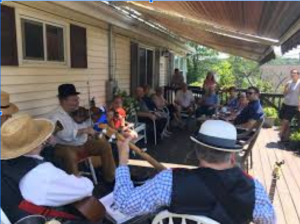
2. Goals and Objectives
Action Brief
- Convince library administrators that by hosting Memory Cafes, they will provide a supportive environment for individuals with memory loss and their caregivers, which will reduce social isolation, foster community, and promote inclusion. This initiative aligns with the library’s mission to provide access to resources, support, and opportunities for all.
Program Goals:
- Connect individuals: Create an environment that facilitates connection among people experiencing memory loss and their caregivers.
- Combat social isolation: Offer a regular opportunity for participants to engage socially in a structured, supportive environment.
- Provide enriching activities: Organize enjoyable, cognitively stimulating activities tailored to the needs and interests of participants.
- Foster a sense of community: Encourage participants to interact with others in their community, promoting feelings of belonging and support.
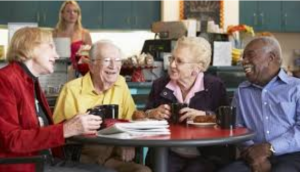
Memory Café: Social Activities for People with Dementia – DailyCaring
3. Target Audience
The Memory Café program will serve individuals with memory loss (such as those with Alzheimer’s, dementia, or other cognitive conditions) and their caregivers. These individuals often face isolation, stress, and a lack of social engagement. The program will provide them with an opportunity to connect with others facing similar challenges, share experiences, and enjoy activities that stimulate memory, creativity, and communication.
4. Inspiration & Precedents
This initiative is inspired by the CarePartners Initiative in Sonoma, which runs a similar Memory Café program. As the only Memory Café in the county, CarePartners has participants who often travel over an hour to attend. By offering this program at the Community Library, we aim to provide an additional, accessible location for participants. The idea for this project arose when a community member inquired at the reference desk about Memory Cafes. This conversation led us to reach out to local senior centers and CarePartners to learn more.
This program is not led by a formal coalition or action group but is an example of community-driven action, similar to the approach outlined by Audrey Barbakoff and Noah Lenstra in The 12 Steps to a Community Led Library.
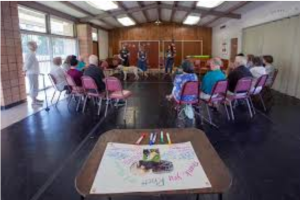
Sonoma Index Tribune, July 24, 2024
Memory Kit Collection at the Community Library
The Community Library offers a Memory Kit collection that is available for checkout. These kits provide valuable resources for individuals with dementia, Alzheimer’s, or cognitive impairments and are designed to offer mental and emotional stimulation while fostering connections with caregivers. Participants of the Memory Café will be able to check out these kits, enhancing their experience with tools that spark conversation and recall familiar memories.
Each kit includes:
- Interactive activities
- Large-print books with colorful illustrations, tailored for those with memory loss
- Soothing or nostalgic music
- Audiovisual materials
Kits are themed around specific time periods, such as “The 1940s,” “The 1950s,” and “Just for Caregivers,” and are designed to cater to different stages of dementia. By leveraging this existing collection, the library will seamlessly integrate these resources into the Memory Café program.
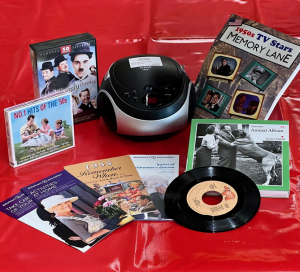
Memory Kits | Sonoma County Library
5. Program Guidelines & Policies
- No Diagnosis Required: Participants do not need to provide a formal diagnosis or documentation of memory loss. The focus will always be on the person, not the disease.
- Open to All: There will be no reservations or RSVPs required. The café will be a drop-in event, making it accessible to those who may be unable to commit to regular attendance.
- Safety First: Activities will be adapted to the participants’ individual needs, ensuring a comfortable and safe environment.
- Inclusivity: The Memory Café will be a space where all participants feel welcome, regardless of their cognitive level.
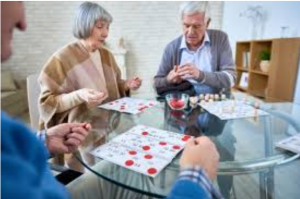
Memory Cafe – Catholic Charities San Francisco
The library staff will collaborate with community partners, such as local senior centers and memory care organizations, to ensure the program’s success. Policies will be developed with input from both staff and external stakeholders to maintain accessibility, safety, and enjoyment.
6. Timeline for Implementation
- Planning Phase (1-2 months):
- Secure community partnerships (e.g., local senior centers, Paws for Life, and guest musicians).
- Obtain approval from co-workers and managers.
- Proposal Phase (1 month):
- Write a program proposal, including the budget and partnership agreements.
- Submit a proposal to the library administration for approval.
- Program Launch (3-4 months):
- Host the first Memory Café event, incorporating feedback from participants and staff to refine future sessions.
- Ongoing promotional efforts to raise awareness and encourage participation.
- Ongoing Operations:
- Monthly evaluations of program effectiveness.
- Adjust activities based on participant feedback and engagement.
7. Marketing the Initiative
To effectively promote the Memory Café program, we will utilize the following strategies:
- Cross-promotion with senior centers and community organizations: Partner with local senior centers and caregiving organizations to spread the word and encourage participation.
- Online Promotion: Use the library’s website, social media platforms, and email newsletters to advertise the Memory Café. This will include sharing testimonials, photos from events, and upcoming session details.
- Flyers and Posters: Distribute flyers and posters at local community hubs, such as hospitals, senior living facilities, and cafés.
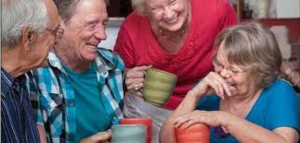
What is a Memory Cafe? | Recent News | DrydenWire.com
“We must capitalize on these opportunities to use everything at our disposal-technology, our buildings, evolving services- to reach all users wherever and whenever they need us.(Stephens, 2016).”
8. Staff Training & Involvement
Staff training will be essential to ensure employees understand the needs of participants and can create a welcoming, supportive environment. Staff interested in attending or interacting with program participants will be encouraged to do so. The Care Partners representative assured us that the program requires minimal training, focusing mainly on planning activities and interacting with attendees.
Training Content:
- Overview of memory loss conditions and the needs of affected individuals.
- Best practices for creating a supportive, inclusive environment.
Training Delivery:
- Training sessions will be held before the program launch, conducted by experienced program coordinators or guest trainers from partner organizations.
The following book will guide the planning: The Alzheimer’s and Memory Café: How to Start and Succeed with Your Own Café by Jytte Lokvig, PhD.
9. Evaluation & Expansion
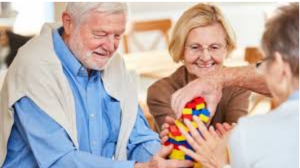
So, What’s a Memory Cafe? – Caring Professionals Home Care & CDPAP
Evaluation Metrics:
- Attendance numbers: Monitor participant attendance and track engagement over time.
- Participant feedback: Gather qualitative feedback from both participants and their caregivers on the effectiveness of the activities and overall experience.
- Partnership success: Evaluate the effectiveness of partnerships with local organizations and their contribution to the program’s success.
Future Expansion:
As the program grows, we can:
- Expand activities to include more sensory-based programs, like nature walks or pet therapy.
- Introduce virtual Memory Cafe events for homebound individuals and caregivers.
- Foster additional partnerships with health professionals, artists, and musicians to enrich the program.
10. Conclusion
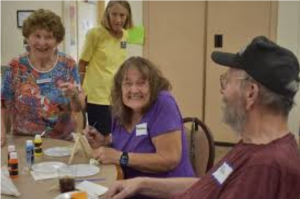
It’s their place: Memory Cafe serves dementia clients, families | Local News | gvnews.com
The Memory Café program at the Community Library will create a welcoming, engaging, and supportive environment for individuals with memory loss and their caregivers. This initiative reflects the library’s commitment to inclusivity, community, and lifelong learning. By thoughtful planning, partnering with local organizations, and evaluating success, the Memory Café will become an integral part of the library’s offerings, contributing to participants’ well-being and fostering a stronger sense of community.
References:
Caring Professionals Inc. (2023, May 11). So, What’s a Memory Cafe? – Caring Professionals Home Care & CDPAP
Catholic Charities. (2025, March). Memory Cafe – Catholic Charities San Francisco
Lenstra, N & Barbakoff, A. (2024, March 1). Working Hand in Hand | American Libraries Magazine
Lokvig, Jytte. (2016). The Alzheimer’s and Memory Café: How to Start and Succeed with Your Own Café. Endless Circle Press.
Peacetown. (2025, March). Peacetown
Sebastopol Senior Center. (2025, March). SEBASTOPOL AREA SENIOR CENTER
Sonoma County Library. (2025, March). Memory Kits | Sonoma County Library
Sonoma County Library. (2025, March). Mission and Vision | Sonoma County Library
Smith, Kelly. (2023, August 24). Green Valley News.It’s their place: Memory Cafe serves dementia clients, families | Local News | gvnews.com
Stephens, M. (2016). The Heart of Librarianship: Attentive, Positive, and Purposeful Change.ALA Editions.
Whitham, Trisha. (2017, September 30). What is a Memory Cafe? | Recent News | DrydenWire.com
https://docs.google.com/document/d/1z9c85K9vEa5_7yet4O0MdS51zpEryihs626u1Rj4B-g/edit?tab=t.0
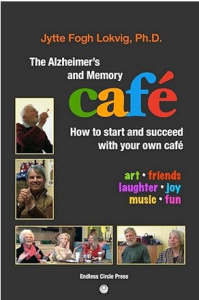
This is such a great, well-written post! I’d never heard of Memory Cafes before so this was a really informative read for me into a service that sounds like a perfect fit for libraries. One of the standout quotes to me was: “The focus will always be on the person, not the disease”, which was, of course, referring to the attendees of this event, but I also thought that its first half (the focus on the person) was a great summation of what participatory libraries should strive to be in general. They should be user-centric, humanistic, and hopefully focused on building a greater sense of community — with an especial effort on making sure that often overlooked communities are not left out of the fold.
Ramasha,
Thank you for reading my post. I am really excited about bringing this service the library where I work. I am also very interested in providing outreach to people with cognitive disabilities and I am wondering if memory cafe’s would work well for both demographics.